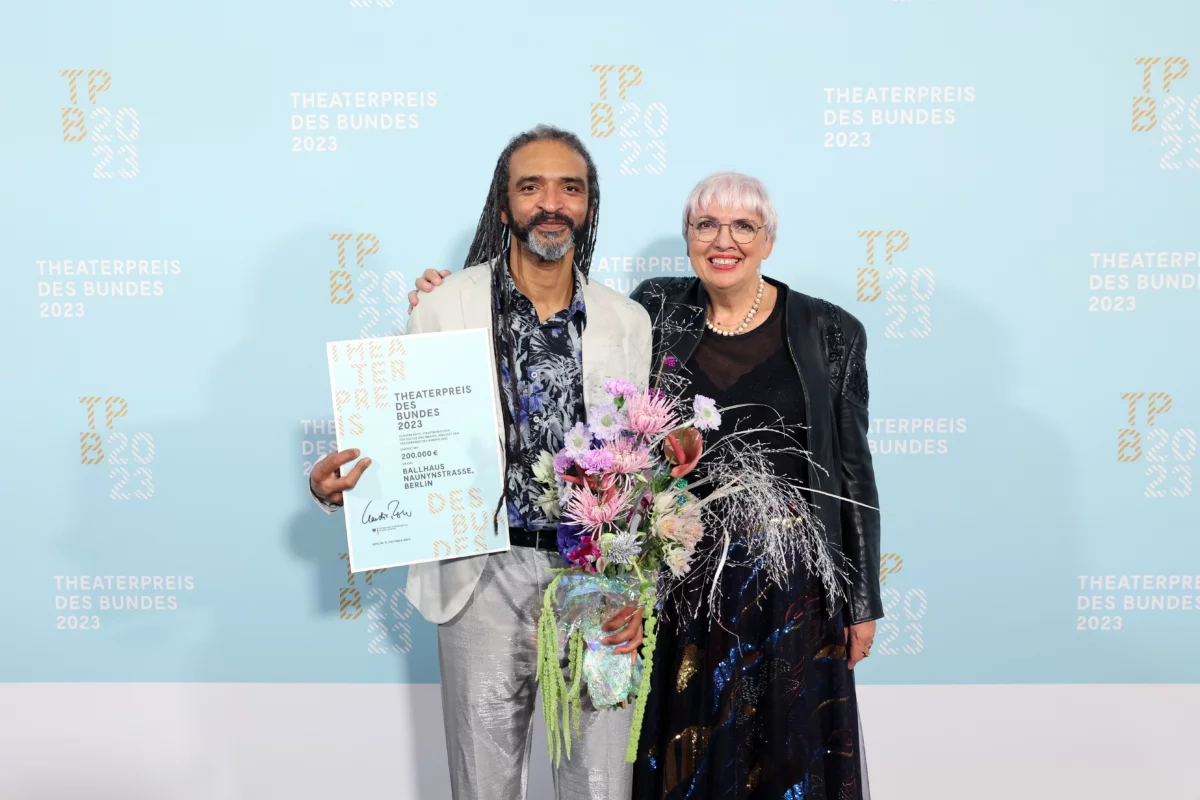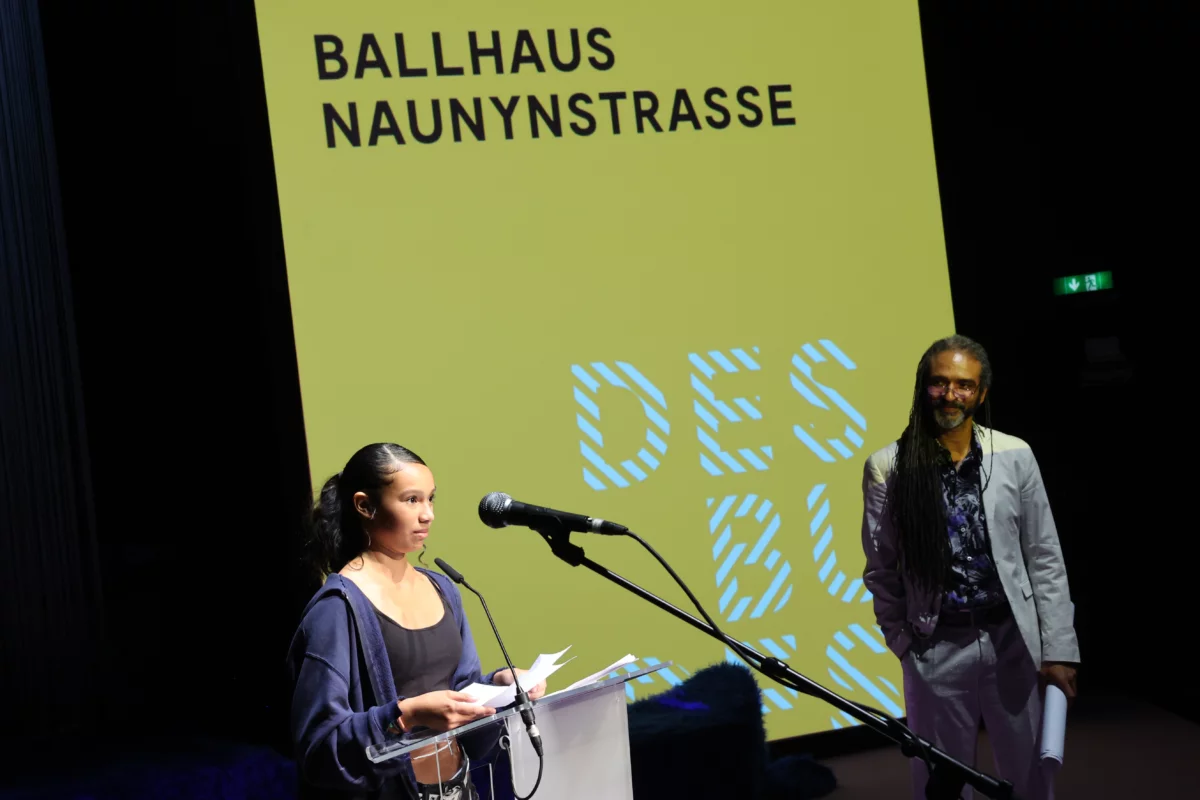Confrontations with reality
By Christine Wahl
Artistic director Wagner Carvalho, artist Magda Korsinsky, and dramaturge Fabian Larsson from Ballhaus Naunynstraße in conversation with Christine Wahl on the award of the Theaterpreis des Bundes 2023.
Wagner Carvalho, Magda Korsinsky, Fabian Larsson – congratulations on the Theaterpreis des Bundes! In principle, of course, every theater is unique in its own way, but with Ballhaus Naunynstraße, where you work, a theater was awarded that actually has a unique selling point in a very concrete sense: It creates – to use the words of the jury - "a singular framework for the self-determined production of Black, queer and artists of color"...
Wagner Carvalho: ...and of course has a lot to do with Shermin!
You mean Shermin Langhoff, your predecessor as artistic director of Ballhaus Naunynstraße, who is now the head of Berlin's Maxim Gorki Theater.
Carvalho: In 2008, Shermin launched the post-migrant theater here with many enthusiastic ideas and little money, and brought in second- and third-generation Turkish, Kurdish and Armenian-German colleagues to the theater. Most of them came from other sectors – and became protagonists here. The invitation of Nurkan Erpulat's and Jens Hillje's production "Verrücktes Blut" to take part in the Berlin Theatertreffen in 2011, which also brought the Ballhaus a lot of national attention, then marked a turning point: The theater received institutional funding. Back then, it started with around 40,000 euros; today, it's just under 1.5 million euros.
2011 was also the year you got involved, right?
Carvalho: Exactly. I was already working artistically in the theater, and at that time I was attending a rehearsal of Michael Ronen's "Waiting for Adam Spielmann" when Shermin approached me very mysteriously and said: I need to talk to you! Then she told me, under the seal of secrecy, that she had been asked to direct the Wiener Festwochen and would like to propose me as her successor at the Ballhaus.
In the end, Shermin Langhoff did not go to Vienna, but moved within Berlin from Kreuzberg to Mitte, to the Gorki Theater. But of course, that didn't change the fact that the post of artistic director at Naunynstraße was vacant. Did you immediately want the job?
Carvalho: I flew to Brazil the day after that conversation with Shermin and, to be honest, didn't think about it at all, because I thought it was a joke. But when I got back, Shermin immediately called me again. I then discussed it with my family and finally agreed – together with Tuncay Kulaoglu, who formed the management team with me until mid-2015. In 2013, we started – with the festival "Black Lux" – to focus on Black perspectives. This also included intersectional issues, queer positions and connecting different diasporic experiences.
 © Dorothea Tuch
© Dorothea Tuch
Wagner Carvalho (Artistic Director and Management Ballhaus Naunynstraße) with Minister of State for Culture Claudia Roth
What does being awarded the Theaterpreis des Bundes mean to you?
Carvalho: The prize is recognition for the artistic practice that has emerged here and for us it means that we are now in the spotlight. That's great, because it has also triggered another wave of euphoria within the company. Because, as Karl Valentin said: Art is beautiful, but it takes a lot of work.
And it also costs money, I might add. With the Theaterpreis des Bundes, you are now not only richer in symbolic capital, but also in economic capital – 200,000 euros to be exact. Are there already investment plans for this?
Fabian Larsson: We would like to continue our writing workshop for new post-migrant theater texts. This took place for the first time in the 2020/21 season, under the motto "unconventional signs," and was very productive; the output was huge. Apart from the fact that important new plays are created in this way – post-migrant literary reflections of society – the writing workshop is also essential as an experience space for the participating artists, because institutionally speaking there are hardly any places where such diverse authors and creative artists can exchange ideas.
Carvalho: But since we don't have an artistic budget, and institutional funding only covers operating and personnel costs, our projects are basically dependent on third-party funding.
Larsson: And the funding system favors innovation: The juries want to support the unprecedented. It’s therefore difficult to get funding for continuing a successful project. In this respect, the Theaterpreis money offers us a unique opportunity to actually continue proven work on a larger scale. Eleven authors took part in the last writing workshop and had the funding that gave them the opportunity to work on their texts for three quarters of a year. The fact that we can now support a comparable number of artists again is of course fantastic.
Carvalho (pointing to Larsson): Fabian plays an absolutely central role in our team, as dramaturge, co-thinker, questioner – and nag. (Unanimous laughter at the table) But that's the way it has to be!
Larsson: That’s practically in the job description!
Where are your nagging qualities particularly in demand?
Larsson: Dramaturges are always annoying! That's part of their function, because they try to decipher meaning at a stage where it's not yet apparent. For people who are directing or composing, this is actually an insanely annoying activity, because they are constantly being mirrored.
Magda Korsinsky: I actually perceived the annoyance very positively! (Renewed laughter) Since my background is in dance, I’m not used to writing texts. Often, at the beginning, I only have an idea – which then, with the help of the dramaturgy, becomes a very precise project description. In this respect, it's totally important for me to have this mirror – especially since the work discussions often take place on walks or in cafés: really an absolute luxury!
Ms. Korsinsky, you are one of the defining artists of the house. After your studies at the HZT (Hochschulübergreifendes Zentrum Tanz) Berlin, you also worked at other theaters. What makes Ballhaus Naunynstraße special in your view?
Korsinsky: Oh, that's a tough question, because there are actually a lot of things! On the one hand, it's the coming together of a variety of Black creative artists and artists of color and with their diverse approaches. On the other hand, it's the flexibility: Normally in theaters – especially in state theaters – there are certain patterns that the creative processes have to follow. At the Ballhaus there are more opportunities for experimentation and innovation – perhaps in part because it is smaller. As an interdisciplinary artist, for example, I'm not tied down to a certain format from the start; I've already been able to do an exhibition here. For me, the Ballhaus is really a place where I can always bring ideas and say: Hey, I just have this or that thought in my head, and then it's just supported from the beginning right through to the premiere.
 © Dorothea Tuch
© Dorothea Tuch
Ballhaus Naunynstraße accepts the 2023 Theaterpreis des Bundes.
One of your evenings that came about in this way and has since been successful not only nationally but also internationally is "Stricken": a complex theatrical installation based on interviews with Afro-German women whose white grandmothers grew up during the Nazi era.
Korsinsky: What I find interesting about it myself are the different perspectives these women have about their grandparents and the history of Nazi Germany – partly also because they work in different professions. As educationists, political scientists, gynecologists, and psychologists, they illuminate the subject from very different angles – at a very high, reflective level.
Larsson: "Stricken" is of course also an important and exemplary evening for us because it raises the question in a clever way: Who is actually allowed to speak about German history? Who is allowed to talk about the experiences that were caused by National Socialism and that reach into the present? Who has the prerogative of interpretation?
Through your work, you bring new perspectives to the theater and, ideally, to other institutions as well, so you are avantgarde in this respect – but in a way that is inherently designed to become mainstream, because the goal is, after all, for the diversity of perspective to become a matter of course in society. Where do you think we stand now in this respect?
Larsson: For us, it's of central importance that we work with artists and with the issues that these people bring with them, which specifically means: with the political challenges that society imposes on Black artists and artists of color. The fact that we take on an avantgarde function through this is not something we choose or seek to do. For us, this means that, on the one hand, we are pleased that post-colonial discourses are now receiving broader attention. But on the other hand, there are concerns that other institutions are just appropriating these discourses as a short-term fashion. I don't think we can afford to think of certain issues like participation, justice, sustainability, etc., as discursive fashions that attract capital.
Do you see this "discourse fashion" danger as well, Ms. Korsinsky and Mr. Carvalho?
Korsinsky: Yes. With the death of George Floyd and Black Lives Matter, for example, Black perspectives seemed to have entered the mainstream; I had a collection of newspapers and magazines at home where they were featured. That was three years ago, and now I don't find as many articles with Black perspectives – that's one thing I’ve noticed. And the other: When I talk to my old school friends in Stuttgart, I always notice that the discourses we take for granted here often haven't even reached there yet.
Carvalho: Our long-term goal as a post-migrant theater is actually to make ourselves superfluous – in the sense that one day there will simply no longer be a need for our theater, because the diversity we work with here has become a natural part of society. But when I was in the Berlin State Parliament the other day for the first reading of the new cultural budget, the Senator for Culture, Joe Chialo, and I were the only Black people in the room. Of course, that doesn't reflect Berlin in any way! And it shows what confrontations we are still going to have with the reality out there in the coming years.